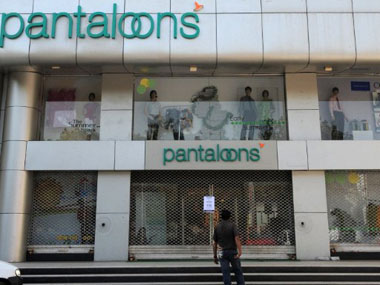By Rajas Kelkar & Rajanya Bose
The stock market starts anticipating things ahead of time. Over the past one week, shares of retail companies have got a significant push on the back of expectations that the government will allow foreign companies to set up multi-brand retail stores. Trent shares rose 15.5 percent, Pantaloon Retail rose 11.4 percent while Shoppers’ Stop rose 6.5 percent.
The stock market expects foreign players to quickly snap up Indian firms at even higher prices. But before that happens, Indian companies have a lot of cleaning up to do.
Pantaloon Retail is a prime candidate. A look at share performance over a year shows why. At a time when the broad-based BSE 500 gained 3.3 percent, Trent shares gained 22.2 percent and Shoppers’ Stop soared 70.8 percent. Pantaloon Retail shares fell 24 percent during the same period.
[caption id=“attachment_36680” align=“alignleft” width=“380” caption=“It does not make any sense to hold on to an investment when the core business is struggling for revenue and profit growth. AFP”]  [/caption]
The numbers say why. For the nine months ended March 2011, Pantaloon Retail’s revenue fell 39 percent to Rs 3,048 crore. The net profit is down 32 percent to Rs 57 crore. The company will announce results for the financial year ended June 30 this month, but those numbers are unlikely to make investors change their views on the company.
Which is why Kishore Biyani, Chairman of the company, is thinking revamp to spruce up the balance-sheet. A report in T_he Economic Times_ on Monday suggested that the company considers financial services as non-core. It may divest Future Capital, its 54 percent subsidiary, to bring more cash into Pantaloon.
Impact Shorts
More ShortsThe finance business saw much fanfare when the group roped in V Vaidyanathan, a top-ranker from ICICI group, with a mouth-watering compensation of Rs 50 crore, including 20 lakh warrants worth Rs 47.40 crore, in August last year. The warrants were issued at Rs 237 and are convertible into Future Capital shares in February 2012. The share price has now fallen to Rs 143.
Vaidyanathan will have to wait for a while to collect his booty. In an interview, he said he was confident of taking the loan book to Rs 5,000 crore by the end of March 2012 and doubling profitability in 12-15 months.
But Biyani has other things on his mind, especially his core business of retailing. The past nine months have been not too happy for Pantaloon Retail in terms of performance primarily because it may be over-leveraged.
The decision to sell 54 percent in Future Capital could bring in much needed cash for the company. It does not make any sense to hold on to an investment when the core business is struggling for revenue and profit growth.
“Pantaloon retail walked on thin ice,” says a managing director at a hedge fund advisory service in Mumbai. Retail is a business where one can buy on credit and sell on cash. This allows the retail chain to use up cash received for expansion of stores. Many retail chains have used the cash flowing in to expand stores," he says.
For example, if a retail company’s average sale per month is Rs 200 crore, it picks up stuff from suppliers on credit that it pays back over two months. This means at any given point of time, the company has Rs 400 crore cash to invest in expansion. Most of the retail companies have adopted this approach.
“This works in a boom phase. However, when things slow, you need to put up capital to pay your creditors,” the managing director added.
Investors clearly see that majority owners at Shoppers Stop (Rajan Raheja) and Trent (the Tata Group) have the ability to bring in capital if needed. Investors do not seem to have the same faith in Pantaloon.
The outperformance of Trent and Shoppers’ Stop suggests a clear preference for these shares.
Biyani now knows that if he is to be ready for the opening up for retail, he will have to clean up his act.
He has time, though. Even if the government allows foreign direct investment (FDI) in multi-brand retail, companies would have to seek permissions from states to set up stores. Besides this, Indian companies are already listed and have a complicated holding structure that could slow down the process.


)

)
)
)
)
)
)
)
)



